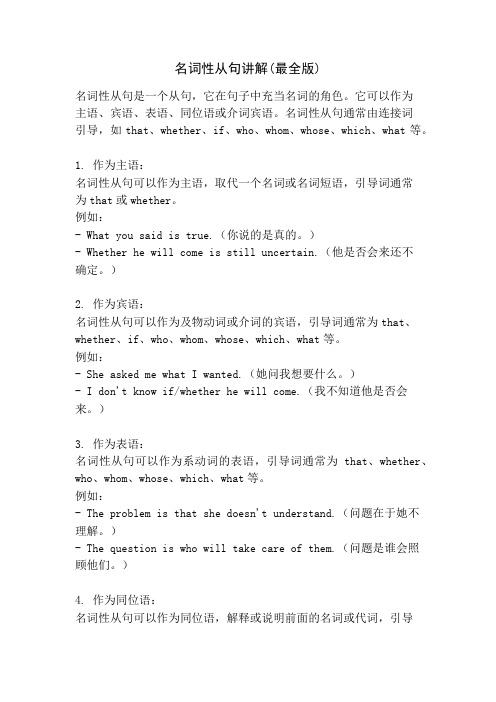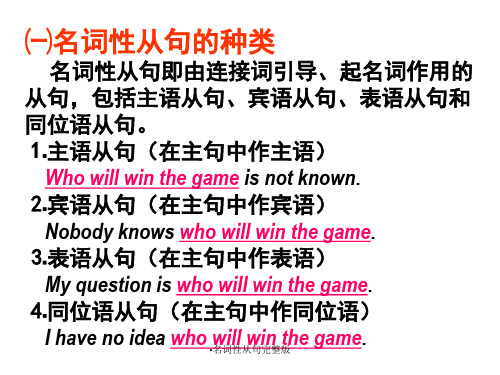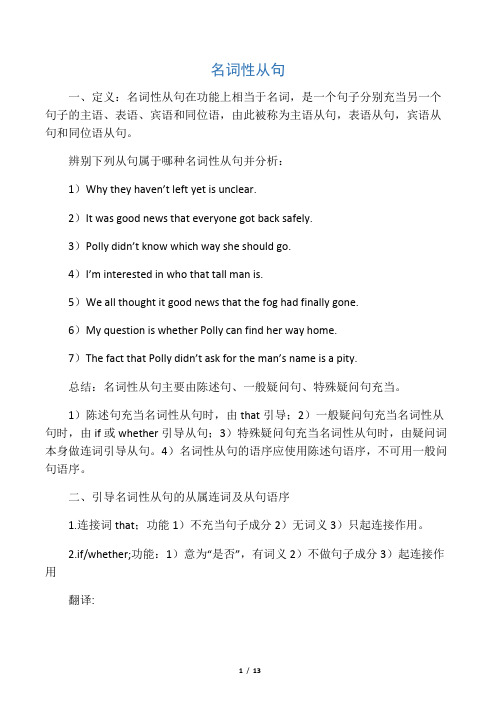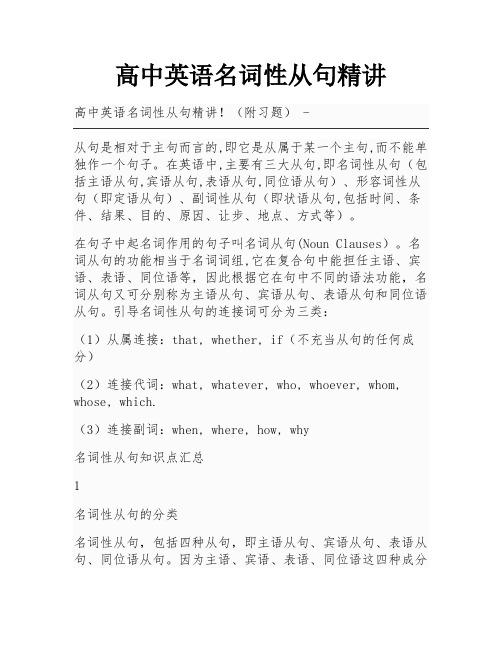名词性从句----绝对经典系列
名词性从句讲解(最全版)

名词性从句讲解(最全版)名词性从句是一个从句,它在句子中充当名词的角色。
它可以作为主语、宾语、表语、同位语或介词宾语。
名词性从句通常由连接词引导,如that、whether、if、who、whom、whose、which、what等。
1. 作为主语:名词性从句可以作为主语,取代一个名词或名词短语,引导词通常为that或whether。
例如:- What you said is true.(你说的是真的。
)- Whether he will come is still uncertain.(他是否会来还不确定。
)2. 作为宾语:名词性从句可以作为及物动词或介词的宾语,引导词通常为that、whether、if、who、whom、whose、which、what等。
例如:- She asked me what I wanted.(她问我想要什么。
)- I don't know if/whether he will come.(我不知道他是否会来。
)3. 作为表语:名词性从句可以作为系动词的表语,引导词通常为that、whether、who、whom、whose、which、what等。
例如:- The problem is that she doesn't understand.(问题在于她不理解。
)- The question is who will take care of them.(问题是谁会照顾他们。
)4. 作为同位语:名词性从句可以作为同位语,解释或说明前面的名词或代词,引导词通常为that、whether、who、whom、whose、which、what等。
例如:- The fact that he lied surprised me.(他撒谎的事实让我感到惊讶。
)- His belief that she will succeed is unwavering.(他坚信她会成功。
名词性从句完整版经典实用

(2)It +be+形容词 (necessary/natural/wonderful/likely/strange/important/certain等 )+that从句
eg.It is wonderful that all of you have passed the difficult exam.
•名词性从句完整版
•13
误:If Mary really heard him is really doubtful. 正:Whether Mary really heard him is really doubtful. 正:It was doubtful if /whether Mary really heard him.
•名词性从句完整版
⒈连词:引导从句但不作任何成分。
⑴that—没有意义,引导主/宾/表/同位语从句。 ①It is said that there will be a party tonight. ②They say (that) there will be a party tonight. ③Why he failed was that he made a vital mistake. ④The key that he succeeded lied in his hard work. ⑵if—是否,引导宾语从句,主语从句。
2 It was a pity that you failed in the exam.
•名词性从句完整版
用it 作形式主语的结构
• It+be+名词(短语)(a pity/a shame/a surprise/no wonder等)+ that从句
ห้องสมุดไป่ตู้
eg. It is a pity that you have missed the wonderful lecture.
英语语法名词性从句精讲1

英语语法名词性从句精讲在复合句中起名词作用的从句叫名词性从句,包括作主语从句、表语从句、宾语从句和同位语从句。
(1)主语从句就是在复合句中作主语的从句。
主语从句常用that, whether, who, whom, whose, what, which, when, where, how, why, whatever, whoever等引导。
如:Whether he will be able to come remains a question. 他是否来还是问题。
That China is a great socialist country is well known. 众所周知,中国是一个伟大的社会主义国家。
注:为避免头重脚轻,使句子平衡,常用it作形式主语,而将主语从句后置。
如上述第二例常说成:It is well known that China is a great socialist country.但是,由连接代词what, whatever, whoever等引导的主语从句一般不能用形式主语。
如:What he found surprised me greatly. 他的发现使我非常吃惊。
Whoever is finished may rest. 凡是做完工的人都可以休息。
(2)表语从句就是在连系动词之后作表语的从句。
引导表语从句的连接除与引导主语从句的连接词外,还有as if,as though。
如:The question is whether he is able to do it alone. 问题是他能否单独做这件事。
It looks as if (though) it is going to snow. 天好像要下雪似的。
注意:要区分以下句式:1. that’s why+结果;that’s because+原因。
2. the reason why /for…is that…He is absent. That’s because he is ill. 他缺席,这是因为他生病了。
(完整版)名词性从句知识点总结

(完整版)名词性从句知识点总结名词性从句知识点总结名词性从句是指在复合句中充当名词的从句。
它可以在句子中充当主语、宾语、表语或同位语。
以下是名词性从句的几个重要知识点:主语从句主语从句在句子中充当主语的角色。
它引导的从句通常由关联词that引导,但有时可以省略。
例如:- That he stole the money is a fact.宾语从句宾语从句在句子中充当宾语的角色。
它通常由关联词that引导,但也可以由其他关联词如whether, if, who, whom等引导。
例如:- She asked me if I had finished my homework.if I had finished my homework.- I wonder whether he will pass the exam.whether he will pass the exam.表语从句表语从句在句子中充当表语的角色。
表语从句通常由关联词that引导,但有时也可以由其他关联词如whether, if, what等引导。
例如:- His biggest concern is that he might lose his job.that he might lose his job.- The question is what we should do next.what we should do next.同位语从句同位语从句在句子中充当同位语的角色,用来解释或说明名词的具体内容。
同位语从句通常由关联词that引导,但也可以由其他关联词如whether, if等引导。
例如:- The fact that he lied to us is very disappointing.that he lied to us is very disappointing.- My hope is that we can find a solution to the problem.that we can find a solution to the problem.以上是名词性从句的一些常见知识点总结。
名词性从句(整理完整版)

名词性从句一、定义:名词性从句在功能上相当于名词,是一个句子分别充任另一个句子的主语、表语、宾语和同位语,由此被称为主语从句,表语从句,宾语从句和同位语从句。
辨别下列从句属于哪种名词性从句并分析:1)Why they haven’t left yet is unclear.2)It was good news that everyone got back safely.3)Polly didn’t know which way she should go.4)I’m interested in who that tall man is.5)We all thought it good news that the fog had finally gone.6)My question is whether Polly can find her way home.7)The fact that Polly didn’t ask for the man’s name is a pity.总结:名词性从句主要由陈述句、大凡疑问句、分外疑问句充任。
1)陈述句充任名词性从句时,由that引导;2)大凡疑问句充任名词性从句时,由if或whether引导从句;3)分外疑问句充任名词性从句时,由疑问词本身做连词引导从句。
4)名词性从句的语序应使用陈述句语序,不可用大凡问句语序。
二、引导名词性从句的从属连词及从句语序1.连接词that;功能1)不充任句子成分2)无词义3)只起连接作用。
2.if/whether;功能:1)意为“是否”,有词义2)不做句子成分3)起连接作用翻译:1)I know that he will come thisevening.___________________________________________2) Whether we will go there or not hasn’t been decided yet.______________________________3.连接代词:what(ever), which(ever), who(ever), whom(ever), whose(ver)功能:1)有词义2)引起从句3)且在从句中充任一定的句子成分,常做从句中的主语、宾语、表语和定语。
名词性从句----绝对经典系列

名词性从句----绝对经典系列名词性从句是在句子中起名词作用的从句,包括主语从句、宾语从句、表语从句和同位语从句。
在高考中,宾语从句是考查最多的,其次是主语从句和表语从句,而同位语从句则很少考查。
名词性从句的连接词有从属连词(如that、whether、if 等)、连接代词(如what、who、whom、whose、which、whatever、whoever、whichever等)和连接副词(如when、where、how、why等)。
主语从句可以直接放在句首,也可以用形式主语It代替,将主语从句放在句子后面。
宾语从句可以充当动词、介词和部分形容词的宾语。
如果宾语从句后面还有宾补,需要使用It作形式宾语,将从句放到宾补后面。
常见的可以接It形式宾语的动词有make、think、find、feel、consider等。
I thought it strange that he didn't call me.This sentence is a complex sentence with a noun clause as the object of the verb "thought"。
The sentence is grammatically correct and needs no further n.We were excited when we heard that he had passed the exam。
The young man's past as a prisoner astonished her。
Everyone was amazed by the unbelievable fact。
The n of who helped us out of difficulty remains unanswered。
The n he asked also remains unanswered.When it comes to noun clauses。
名词性从句(整理完整版)

名词性从句一、定义:名词性从句在功能上相当于名词,是一个句子分别充当另一个句子的主语、表语、宾语和同位语,由此被称为主语从句,表语从句,宾语从句和同位语从句。
辨别下列从句属于哪种名词性从句并分析:1)Why they haven’t left yet is unclear.2)It was good news that everyone got back safely.3)Polly didn’t know which way she should go.4)I’m interested in who that tall man is.5)We all thought it good news that the fog had finally gone.6)My question is whether Polly can find her way home.7)The fact that Polly didn’t ask for the man’s name is a pity.总结:名词性从句主要由陈述句、一般疑问句、特殊疑问句充当。
1)陈述句充当名词性从句时,由that引导;2)一般疑问句充当名词性从句时,由if或whether引导从句;3)特殊疑问句充当名词性从句时,由疑问词本身做连词引导从句。
4)名词性从句的语序应使用陈述句语序,不可用一般问句语序。
二、引导名词性从句的从属连词及从句语序1.连接词that;功能1)不充当句子成分2)无词义3)只起连接作用。
2.if/whether;功能:1)意为“是否”,有词义2)不做句子成分3)起连接作用翻译:1)I know that he will come thisevening.___________________________________________2) Whether we will go there or not hasn’t been decided yet.______________________________3.连接代词:what(ever), which(ever), who(ever), whom(ever), whose(ver)功能:1)有词义2)引起从句3)且在从句中充当一定的句子成分,常做从句中的主语、宾语、表语和定语。
高中英语名词性从句精讲

高中英语名词性从句精讲从句是相对于主句而言的,即它是从属于某一个主句,而不能单独作一个句子。
在英语中,主要有三大从句,即名词性从句(包括主语从句,宾语从句,表语从句,同位语从句)、形容词性从句(即定语从句)、副词性从句(即状语从句,包括时间、条件、结果、目的、原因、让步、地点、方式等)。
在句子中起名词作用的句子叫名词从句(Noun Clauses)。
名词从句的功能相当于名词词组,它在复合句中能担任主语、宾语、表语、同位语等,因此根据它在句中不同的语法功能,名词从句又可分别称为主语从句、宾语从句、表语从句和同位语从句。
引导名词性从句的连接词可分为三类:(1)从属连接:that, whether, if(不充当从句的任何成分)(2)连接代词:what, whatever, who, whoever, whom, whose, which.(3)连接副词:when, where, how, why名词性从句知识点汇总1名词性从句的分类名词性从句,包括四种从句,即主语从句、宾语从句、表语从句、同位语从句。
因为主语、宾语、表语、同位语这四种成分均可以由名词构成,所以这四种从句在主句中都充当了名词的作用,故将这四种从句统称为名词性从句。
如:1.That she will help me made us happy.(主语从句)2.I can understand what he said.(宾语从句)3.This is where I was born.(表语从句)4.The fact that a heavy earthquake happened made me crazy.(同位語从句)2名词性从句的连接词分类1.that(无含义,不充当成分)2.whether,if(有“是否”的含义,但不充当成分)3.连接代词:what, whatever, who, whoever, whom, whomever, whose, which, whichever.(在从句中做主语、宾语、表语和定语)连接副词:when, whenever, where, wherever, how, however, why (在从句中做状语)4. as if,as though,because(不充当成分,在名词性从句中只引导表语从句)3连接词 that 在名词性从句中可以省略的三种情况1.it 做形式主语,that引导主语从句时It is said (that) he has been studying abroad.据说他一直在国外学习。
- 1、下载文档前请自行甄别文档内容的完整性,平台不提供额外的编辑、内容补充、找答案等附加服务。
- 2、"仅部分预览"的文档,不可在线预览部分如存在完整性等问题,可反馈申请退款(可完整预览的文档不适用该条件!)。
- 3、如文档侵犯您的权益,请联系客服反馈,我们会尽快为您处理(人工客服工作时间:9:00-18:30)。
名词性从句Noun Clauses一.基础定义和连接词1. 名词性从句:就是在句子中起名词作用的从句。
2. 名词性从句包括4种从句:主语从句、宾语从句、表语从句、同位语从句。
从高考的考查的实际情况来看,名词性从句考得最多的是宾语从句,其次是主语从句,再次是表语从句,而同位语从句则很少考查。
[判断]以下从句类型:1) The truth is that I have been there.( )2) The fact that she was late surprised us.( )3) That he will come is certa in.( )4) I know that he will come.( )3. 名词性从句的连接词有:从属连词(不做成分):that (无意义)‘whether, if(是否)….连接代词(在从句中做主,宾,表,定):what, who, whom, whose, which, whatever, whoever, whichever连接副词(在从句中做状语):whe n, where, how , why二.名词性从句位置和特点主语从句:1.可直接放在句首。
2. 主语较长时通常用It作形式主语,而将主语从句放在后面。
1) . ___ he knows Japaneses known to all.2) . _____ surprised me was to see him here .3) ________ he is comingdoesn' t matter much.4) It remains a secret _____ they climbed up the mountain.宾语从句:可做动词,介词和部分(表情感态度的)形容词词的宾语。
I want to know whe n we will start.Everyth ing depe nds on whether we have eno ugh time.I ' imfraid (that) I have made a mistake.注意:如果宾语从句后面有宾补要使用it作形式宾语而将从句放到宾补后面。
常见的可以接it形式宾语的动词有:make, think, find, feel, consider等He made it clear that he was determined to resign .I thought it strange that he didn ' t call me.表语从句:1. 位于系动词动词之后。
常见此类系动词有be, look , seem,即pear等It seems that she has known the truth.It looks as if it is going to rain.This school is no Ion ger what it was before.2. 主语是reason时,表语从句常用that引导,不用because引导。
The reason for his absenee was _____ he was ill.3. 表语从句可以用as if, as though,和because引导.It seemed as if he had done someth ing great.That is because he has got lost.4. 注意下面句型的习惯译法:This is whereLu Xun once lived. _______________________That was how they won the match. ______________________This is whyshe got up so early this morning. _____________________同位语从句:1. 位于名词之后,通常为含义,概念名词,解释说明它的含义和内容。
这样的名词有:belief, fact, hope, idea, doubt, news ,conclusion, problem, information, opinion, promise, truth, suggesti on …2. 同位语从句与定语从句的区别:1 )从意义上讲前者对名词加以补充说明,后者对名词加以修饰和限定。
2 )同位语从句的引导词不可省略,定语从句的引导词有时可省略。
3)同位语从句的引导词that在从句中不充当任何成分,定语从句的引导词在从句中必须充当一定成分。
判断下面从句类型:We were excited about the n ews (that) he had told us. ( )We were excited about the news that he had passed the exam.( )The fact that the young man had bee n a pris oner ast on ished her .( )The fact that was un believable ast oni shed every one.( )The question who helped us out of difficulty remains to be answered.( )The questi on which he asked remai ns to be an swered.( )三.名词性从句的主要考点1.名词性从句要用陈述语序。
尤其是含疑问意义的wh-类的词引出的从句要倍加注意、。
Why was she cryingI don ' t know why he was crying.引导宾语语从句时可省略,引导其他从句一般不可省略。
[判断]下面那个that可以省略1) I know that he will come soon.2) That they are good at English is known to us all.3) The problem i s that we don ' t have enough money.4) She expressed the hope that they would come to China one day.[注意]由连词and连接的两个由that引导的宾语从句中,第二个that不省略.He told me (that) he would come and that he would come on time.和if的选择问题A whether能引导所有名词性从句;只能引导宾语从句(也可引导不位于句首的主语从句)B. 介词后的宾语从句只能用whether不能用if 。
C. whether能和or not连用,而if不可以D. whether常与or连用表示一种选择,if不能这样;E. whether也可与动词不定式连用但if不能。
[填空]用whether和if填空1) I don ' t kno ________ he will come.2) I have not decided ________ to go or not.3) _____________________ It all depends on they will come back. 引导名词性从句时可有两种意义:保持原有的疑问意义,表示什么”。
I don ' t know what he wants. 表示“…的东西,…..的事情”。
That' s what he wants.5. who引导的名词性从句译为谁…的事”---指事。
Whoever引导的名词性从句译为任何…的人”---指人。
[翻译句子].Who will be sent there has ncTedd e di nWhoever will be sent there will be paid a lot. ____________________6 which和what引导定语从句的区别:Which有范围,表示一定范围内的哪一个…”What没有范围,直接翻译成什么….”.I don ' t know what you want. ______________There are two books. Can you tell me which you want _________________7.名词性从句的时态问题1. 当主句的谓语动词是过去式时,宾语从句若不是一个客观事实或真理,其谓语动词也必须用某种过去时态。
如:She said that she ___________ (do) want to know. 她说她不想知道。
I asked her whether she ____________ (will) agree.我问她是否会同意2. when, if引导名词性从句且表示将来意义时,要直接使用将来时态;但当它们引导状语从句且表示将来意义时,则必须用一般现在时表示将来意义。
如:I don ' t know when he will come, but when he comes, I ' ll call you.句中第一个when引导的是_______ 从句,故用将来时态表示将来意义;第二个when引导的是_________ 从句,故用一般现在时表示将来意义。
